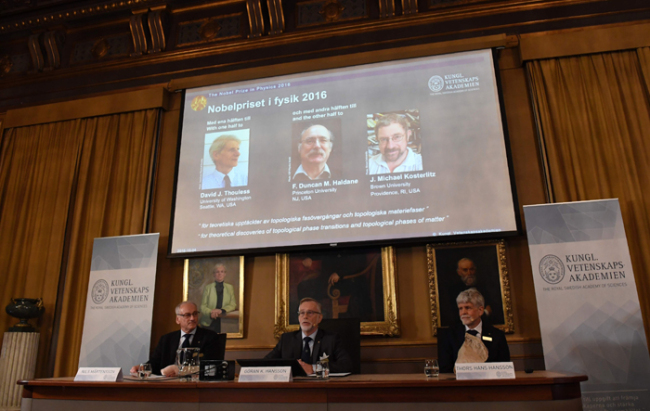Three British scientists share Nobel for the ‘discovery of exotic states of matter’
Research studies on unusual states of matter such as in super-conductors won Nobel prize in Physics to British-born Scientists David Thouless, Duncan Haldane and Michael Kosterlitz .
“Thanks to their pioneering work, the hunt is now on for new and exotic phases of matter,” the Royal Swedish Academy of Sciences said in a statement awarding the 8 million Swedish crown ($937,000) prize.
BREAKING NEWS #NobelPrize in Physics 2016 to David Thouless, Duncan Haldane and Michael Kosterlitz pic.twitter.com/5jw75GIjRv
— The Nobel Prize (@NobelPrize) October 4, 2016
“Many people are hopeful of future applications in both materials science and electronics.”
Thouless received half the prize with Haldane and Kosterlitz who both shared the remaining half.

Nils Martensson, acting chairman of the Nobel Committee for Physics, announced the laureates in a news conference. The Nobel committee observed that the winners had discovered a set of totally unexpected regularities in the behaviour of matter.
“This has paved the way for designing new materials with novel properties and there is great hope that this will be important for many future technologies,”Martensson said.
The prize announcement for Physics come after Japan’s Yoshinori Ohsumi was awarded the prize for medicine on Monday.
Having won Nobel in Physics, the trio will join the ranks of some of the greatest names in science, including Albert Einstein, Niels Bohr and Marie Curie.
Nobel prize was first awarded in 1901 to honour individual achievements in the field of science, literature and peace as per the will of Swedish chemist and business tycoon Alfred Nobel. Nobel left a lion’s share of his wealth to establish the award.
Also read:
IISc scientist’s ‘edible stain’ all set to revolutionize research practices

OMG-inducing, share-compelling, like-attracting, clutter-breaking, thought-provoking, myth-busting content from the country’s leading content curators. read on...
